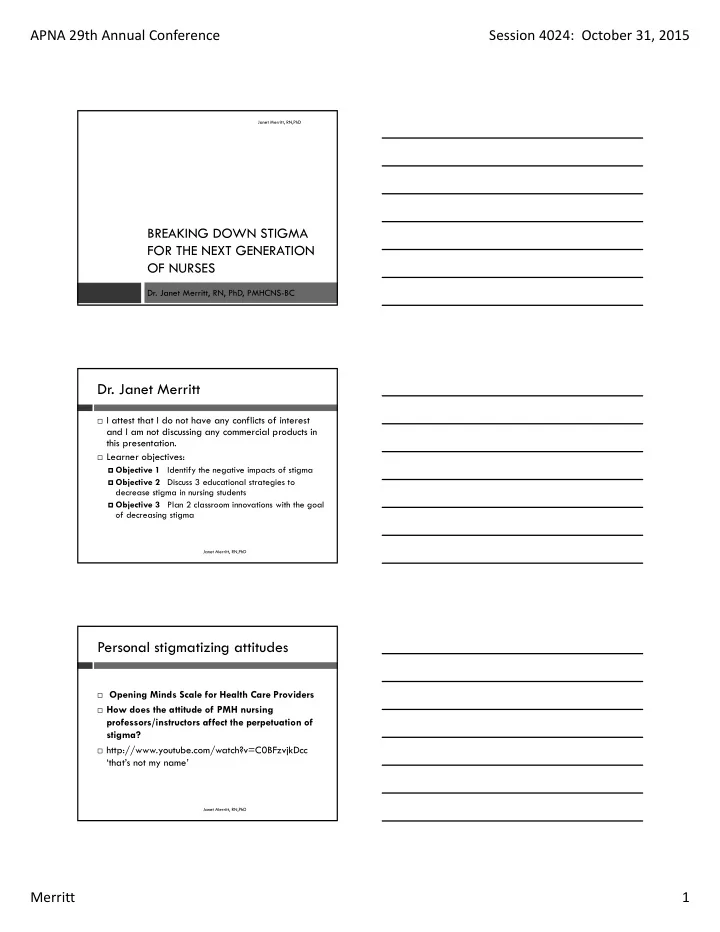

APNA 29th Annual Conference Session 4024: October 31, 2015 Janet Merritt, RN,PhD BREAKING DOWN STIGMA FOR THE NEXT GENERATION OF NURSES Dr. Janet Merritt, RN, PhD, PMHCNS-BC Dr. Janet Merritt I attest that I do not have any conflicts of interest and I am not discussing any commercial products in this presentation. Learner objectives: Objective 1 Identify the negative impacts of stigma Objective 2 Discuss 3 educational strategies to decrease stigma in nursing students Objective 3 Plan 2 classroom innovations with the goal of decreasing stigma Janet Merritt, RN,PhD Personal stigmatizing attitudes Opening Minds Scale for Health Care Providers How does the attitude of PMH nursing professors/instructors affect the perpetuation of stigma? http://www.youtube.com/watch?v=C0BFzvjkDcc ‘that’s not my name’ Janet Merritt, RN,PhD Merritt 1
APNA 29th Annual Conference Session 4024: October 31, 2015 Negative Impact of Stigma Reluctance to get help Lack of understand by family and friends Less opportunities for employment Less opportunities for housing Janet Merritt, RN,PhD Impacts Continued Bullying, physical violence, harassment Health insurance that doesn’t adequately cover mental illness treatment A belief that you’ll never be able to succeed or improve your situation (Mayo clinic http://www.mayoclinic.org/diseases- conditions/mental-illness/in-depth/mental-health/ART- 20046477) Janet Merritt, RN,PhD Strategies to decrease stigma in the classroom Person first language Personal experiences and stories of those with a mental illness Journal articles about the impact of stigma You tube videos Janet Merritt, RN,PhD Merritt 2
APNA 29th Annual Conference Session 4024: October 31, 2015 Person first language “The difference between the right word and the almost right word is the difference between lightning and the lightning bug.” —Mark Twain Janet Merritt, RN,PhD Deficit-Based Language Strengths-Based, Recovery- Oriented Alternative A schizophrenic… a borderline… A person diagnosed with… Clinical case manager Recovery coach… guide… Front-line staff… in the trenches… Direct-support staff Substance abuse/abuser Person living with… SA interferes with… Suffering from Living with… recovering from… Treatment team Recovery team High-functioning vs. low-functioning A person’s symptoms/addiction interferes with the following Unrealistic Idealistic… high expectations… Resistant… non-compliant… Disagrees with… chooses alternative… Weaknesses Barriers to change… support needs…. Maintaining clinical stability… Promoting life worth living abstinence… Puts self/recovery at risk Takes risks to try new things/grow Treatment works Person uses treatment as a tool in recovery (Tandora, J., 2011) Janet Merritt, RN,PhD What We Expect for Us What We Expect for Them Compliance with treatment Life worth living Decreased symptoms/clinical A spiritual connection to God/others/self stability Being a good mom/dad/daughter Better judgment Friends Increased insight Fun/laughter Reduced aggression Nature/music/hobbies Acceptance of illness/disability Pets Adherence to team’s Love/intimacy/sex recommendations Having hope for the future Decreased hospitalization Joy Residential stability Giving back/being needed Abstinence from substances Learning Increased functioning A home of our own Active engagement/showing up (Tandori, J., 2011) Improved cognitive functioning Realistic expectations Janet Merritt, RN,PhD Merritt 3
APNA 29th Annual Conference Session 4024: October 31, 2015 We must be intentional with language Many/most of the consumers that we work with see us as the ‘experts’ They generally see us as knowledgeable about the illnesses that they have Many see the ideas that we express and the language that we use as ‘right’; the right way to speak, the right way to think, the right way to be’ and this gives us power and influence Therefore, we must be very careful about how we use language. Often it is not WHAT we communicate but HOW we communicate Copeland, 2008 Janet Merritt, RN,PhD The Power of Person First Language Increases hope Increases empowerment Decreases stigma Conveys support Acknowledges that the person is much more than their diagnosis Aids in collaborative HCP and recipient of care relationships Janet Merritt, RN,PhD Personal experiences and stories of those with a mental illness I share my own story of having Premenstrual dysphoric disorder in the past. I invite a person with a persistent and chronic mental illness to speak with the class Janet Merritt, RN,PhD Merritt 4
APNA 29th Annual Conference Session 4024: October 31, 2015 Journal articles about the impact of stigma Shame, blame, and contamination: A review of the impact of mental illness stigma on family members. Patrick W. Corrigan& Fredrick E. Miller (2004). Stigma, negative attitudes and discrimination towards mental illness within the nursing profession: a review of the literature. C. A. Ross & E. M. Goldner (2008). Understanding the Stigma of Mental Illness. Patrick W. Corrigan. (2008). Janet Merritt, RN,PhD You tube videos https://www.youtube.com/watch?v=21U4sa187GY “Schizo” https://www.youtube.com/watch?v=WUaXFlANojQ “Grand central Station” https://www.youtube.com/watch?v=IpgKDKAhwBQ &list=PL4PBfis_hYrYXBwg4QcbR2rmstxB- c48h&index=3 (car accident) https://www.youtube.com/watch?v=Z_IbGI7Z1SM &index=4&list=PL4PBfis_hYrYXBwg4QcbR2rmstxB- c48h Janet Merritt, RN,PhD Classroom innovations ‘Flipped classroom’ In class time is spent on case studies and other active learning strategies ‘Clicker questions’ are used Many are used regarding attitude/opinion questions. This initiates discussion and brings to personal awareness stigmatizing attitudes. Janet Merritt, RN,PhD Merritt 5
APNA 29th Annual Conference Session 4024: October 31, 2015 Clinical approaches to decrease Stigma Recovery Narrative Students are paired with a client that they can meet with over the course of the semester (9 times) The client is a person with lived experience of mental illness living in the community The purpose of the assignment is for students to get to know clients on a personal level in order to gain an in- depth understanding of their experiences. Students then prepare a 15 to 20 page ‘recovery narrative’ to describe the client’s life story and the clients then review it for accuracy. Knaak, S., Szeto, A., Robinson, R., Karpa, J. & Patten, S. (2013) Janet Merritt, RN,PhD References Copeland, M.E. (2009). Facilitator training manual: Mental health recovery including Wellness recovery action plan curriculum. USA: Peach Press. Knaak, S., Szeto, A., Robinson, R., Karpa, J. & Patten, S. (2013). Brandon University Psychiatric Nursing Program Evaluation Report. www.mentalhealthcommission.ca Mayo clinic http://www.mayoclinic.org/diseases- conditions/mental-illness/in-depth/mental-health/ART- 20046477 Janet Merritt, RN,PhD Merritt 6
Recommend
More recommend